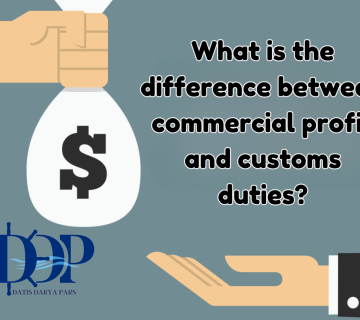What is customs duty and how is it calculated?
Customs duty is one of the oldest and most important sources of government revenue. It includes taxes and tariffs imposed on the import and export of goods. Customs duty is used to protect domestic industries, control the volume of imports, encourage exports, and generate income for governments. In the following, we will examine the concept of customs duty and how it is calculated.
Definition of Customs Duty
Customs duty is the amount that governments impose on imported and sometimes exported goods. This amount is collected as a form of tax on goods crossing the borders of a country. Customs duty is usually determined as a percentage of the value of the goods but can also be calculated as a fixed or variable amount. Governments use this duty to regulate foreign trade, support domestic production, and generate income.
Objectives of Customs Duty
Customs duty serves several objectives, including:
- Protection of domestic industries: One of the main goals of imposing customs duty is to protect domestic production from foreign goods. By increasing the costs of imports, the prices of imported goods rise, which can help strengthen the competitiveness of domestic products.
- Controlling imports: Governments can control the amount and type of imported goods through customs duties. This helps to prevent the entry of unnecessary or dangerous goods.
- Generating income for the government: Customs duty is an important source of revenue for governments. This income helps fund government projects and public services.
- Developing international trade: Using the customs duty system, governments can adjust their foreign trade in such a way that national interests are always preserved and international trade is strengthened.
Types of Customs Duty
Customs duties are divided into several types, each with specific goals and features. Some of the most important types are:
- Import duties (import tariffs): This type of duty is applied to goods entering a country. Import tariffs are imposed to protect domestic industries and regulate the volume of imports.
- Export duties (export tariffs): This type of duty is applied to goods leaving a country. Governments use export duties to control exports and preserve domestic resources.
- Special duties (special tariffs): These tariffs are applied to goods imported for specific reasons such as health, security, or protection issues.
Factors Affecting Customs Duty Rates
The rate of customs duty applied to imported or exported goods depends on several factors:
- Type of goods: Some goods, due to their specific sensitivities (e.g., health or military goods), have higher customs duties.
- Value of goods: Customs duty is usually determined as a percentage of the value of the goods. The higher the value of the goods, the higher the customs duty.
- Origin or destination of goods: The country of origin or destination of the goods can also affect the customs duty rate. Countries that have special trade agreements with each other may benefit from lower customs duties.
- Government policies: Governments may change customs tariffs based on their economic and trade policies. For example, to encourage exports, the customs duty on exported goods may be reduced.

How to Calculate Customs Duty
The calculation of customs duty depends on the type of goods, their value, and the tariffs imposed by the government. Customs duties are usually calculated in two ways: as a percentage or as a fixed amount:
- Percentage method: In this method, customs duty is calculated as a percentage of the value of the goods. For example, if the customs duty on a product is 10% and the value of the product is $100, the customs duty will be $10.
- Fixed method: In this method, a fixed amount is determined as the customs duty for each unit of goods. For example, the government may set a fixed amount as the customs duty for each ton of wheat.
Documents Required for Paying Customs Duty
To pay customs duties, importers and exporters must provide specific documents to the customs office. These documents include purchase invoices, transportation documents, and a customs declaration. The customs office reviews these documents and determines the amount of customs duty payable.
Customs Exemptions
In some cases, governments may grant exemptions from paying customs duties. These exemptions are usually applied to goods that are of special social or economic importance. For example, goods related to public health or goods imported for charitable projects may be exempt from customs duties.
The Role of the World Trade Organization (WTO) in Regulating Customs Duties
The World Trade Organization (WTO) plays an important role as an international body in regulating and coordinating customs tariffs globally. The organization works to reduce tariffs and remove trade barriers through negotiations between countries. Therefore, many countries must consider the rules and obligations of the WTO when determining their customs duties.
Conclusion
Customs duty is one of the important economic tools used by governments to regulate foreign trade and protect domestic industries. The rate of customs duty is determined based on factors such as the type of goods, their value, and government economic policies. Through the imposition and adjustment of customs duties, governments can regulate the country’s imports and exports and generate revenue for themselves.

 then 'Add to home screen'
then 'Add to home screen' then 'Add to home screen'
then 'Add to home screen'

بدون دیدگاه